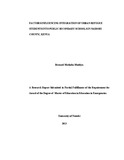| dc.description.abstract | Education is globally recognized as a human right and many countries have realized this. The purpose of the study was to investigate the factors that influence the integration of urban refugee students into public secondary schools in Nairobi County. The objectives of the study were to determine the influence of factors such as legal status, identity documents, discrimination, and police officers’ attitude on integration of urban refugee students into public secondary schools in Nairobi County. The study employed descriptive survey design. The target population for this study was five school principals, 200 teachers and the refugee students in the five schools only. The researcher used purposive sampling. The instruments of data collection for this study were interview schedules for school principals, questionnaires for teachers and also for students. Data was analyzed using both descriptive and inferential statistics. Quantitative data was analyzed using Statistical Package for Social Sciences and the results were presented using frequency tables, pie charts and percentages to make meaningful conclusions. Qualitative data was analyzed through content analysis which in turn was analyzed by organizing data into themes, patterns and sub-topics. The researcher came up with conclusions of the content and data analysis of instruments that could not be quantified. The findings from this study will be useful in providing schools, District Education Officers (DEO’s), County Directors of Education, the Ministry of Education, the Government of Kenya and National and International Non Governmental Organizations with essential information on the factors that influence integration of urban refugee students into public secondary schools. Refugee students also have a right to access education in urban schools. Based on this argument and the study findings, it can therefore be recommended that all refugee students be given equal chance to access education by the government through the school authorities. Discrimination among students should be abolished through sensitization programmes e.g. through school forums to enlighten students on the importance of having refugee students also access education and more so the reasons that led to their current situation. The government should also abolish some unnecessary procedures for refugee students to access urban education e.g. they should relax on such requirements such as parents producing national identity card on registration of their children, students required to produce their birth certificates and other evils such as police harassment and suspicion. Above all refugee students should also be encouraged to participate fully in school programmes through financial aid from the donors to meet their expenses, including their school fees and through sensitization programmes to perform academically. | en |

